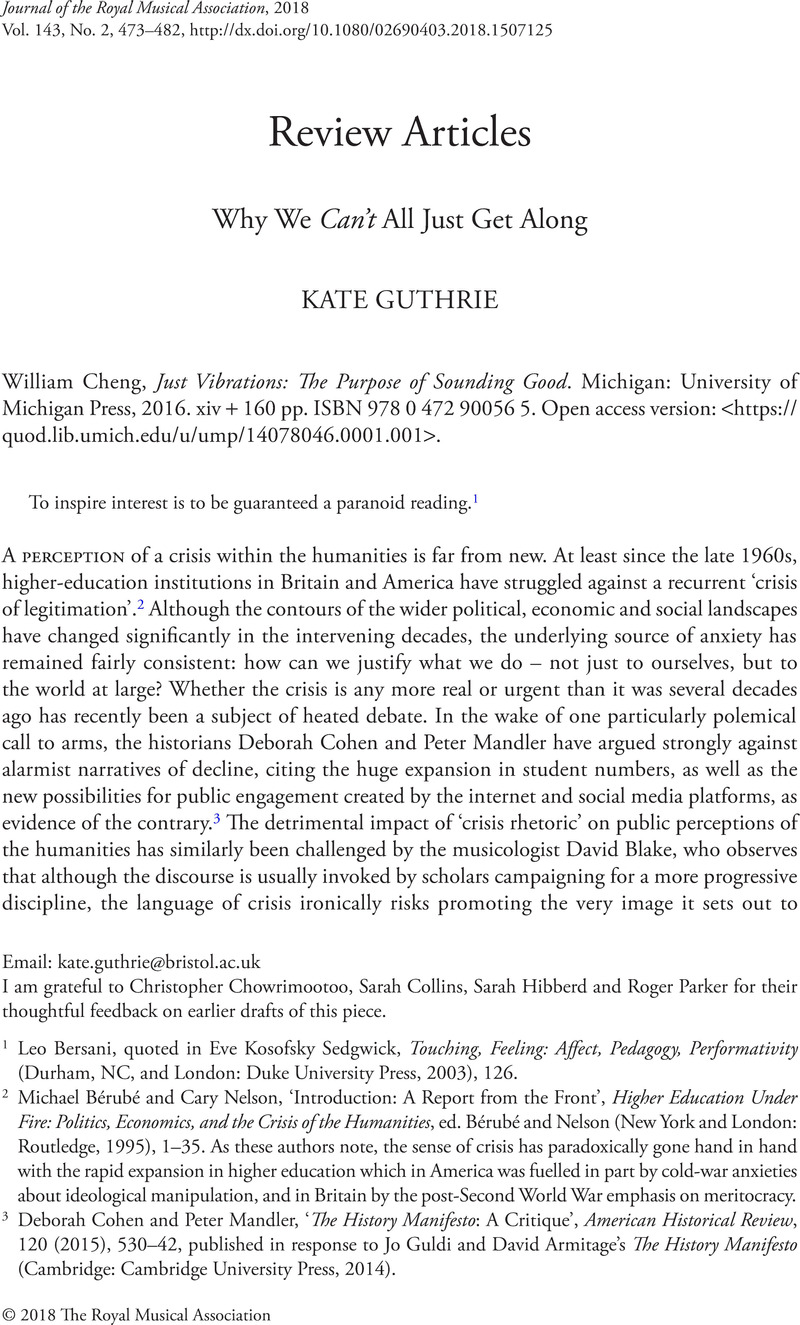Published online by Cambridge University Press: 01 January 2020

I am grateful to Christopher Chowrimootoo, Sarah Collins, Sarah Hibberd and Roger Parker for their thoughtful feedback on earlier drafts of this piece.
1 Leo Bersani, quoted in Eve Kosofsky Sedgwick, Touching, Feeling: Affect, Pedagogy, Performativity (Durham, NC, and London: Duke University Press, 2003), 126.
2 Michael Bérubé and Cary Nelson, ‘Introduction: A Report from the Front’, Higher Education Under Fire: Politics, Economics, and the Crisis of the Humanities, ed. Bérubé and Nelson (New York and London: Routledge, 1995), 1–35. As these authors note, the sense of crisis has paradoxically gone hand in hand with the rapid expansion in higher education which in America was fuelled in part by cold-war anxieties about ideological manipulation, and in Britain by the post-Second World War emphasis on meritocracy.
3 Deborah Cohen and Peter Mandler, ‘The History Manifesto: A Critique’, American Historical Review, 120 (2015), 530–42, published in response to Jo Guldi and David Armitage's The History Manifesto (Cambridge: Cambridge University Press, 2014).
4 David Blake, ‘Musicological Omnivory in the Neoliberal University’, Journal of Musicology, 34 (2017), 319–53 (p. 322).
5 The essay is published in Sedgwick, Touching, Feeling, 123–52. An earlier version of this material was included in the introduction to Novel Gazing: Queer Readings in Fiction, ed. Sedgwick (Durham, NC: Duke University Press, 1997).
6 Ricoeur's terminology was taken up by philosophers and intellectual historians among others, but proved less popular in literary studies, where the ready embrace of post-structuralism superseded interest in the hermeneutic tradition: Rita Felski, ‘Critique and the Hermeneutics of Suspicion’, M/C Journal, 15/1 (2012), <http://journal.media-culture.org.au/index.php/mcjournal/article/view/431> (accessed 16 April 2018).
7 Recent years have seen a growing tide of dissent against paranoid critique. Other significant works in this field include: Amanda Anderson, The Way We Argue Now: A Study in the Cultures of Theory (Princeton, NJ: Princeton University Press, 2013), and Rita Felski, The Limits of Critique (Chicago, IL, and London: University of Chicago Press, 2015).
8 These are just some of the less traditional, non-specialist sources that Cheng draws on throughout the book. For his fuller list, see p. 14. The broadened evidence base intersects (among other things) with an emerging trend in media and fan studies, where web ethnography is on the rise. For example, see Kiri Miller, Playable Bodies: Dance Games and Intimate Media (New York: Oxford University Press, 2017).
9 For an explanation of why paranoid and reparative modes are especially pertinent to queer studies, see Sedgwick, Touching, Feeling, 124–6.
10 Sedgwick's A Dialogue on Love (Boston, MA: Beacon Press, 1999) similarly charts her experience of the therapy for depression she underwent in the wake of breast cancer, although through more poetic language. For an introduction to confessional criticism, see Confessions of the Critics, ed. H. Aram Veseer (New York and London: Routledge, 1996).
11 This field of study follows Suzanne Cusick's seminal article ‘Music As Torture / Music As Weapon’, Trans: Revista transcultural de música, 10 (2006), <http://www.sibetrans.com/trans/articulo/152/music-as-torture-music-as-weapon> (accessed 26 October 2017).
12 For this reparative definition, the author cites the literary theorist Ellis Hansen.
13 University of Michigan Press, ‘Just Vibrations’, <https://www.press.umich.edu/9293551/just_vibrations> (accessed 7 December 2017).
14 Sedgwick, Touching, Feeling, 2.
15 Ibid., 127–8.
16 Susan McClary, Feminine Endings: Music, Gender and Sexuality (Minneapolis, MN: University of Minnesota Press, 1991).
17 The violent reactions to Pierpaolo Polzonetti's ill-fated blogpost for Musicology Now are a recent case in point: ‘Don Giovanni Goes to Prison: Teaching Opera Behind Bars’ (16 February 2016), available at <http://musicologynow.ams-net.org/2016/02/don-giovanni-goes-to-prison-teaching_16.html> (accessed 16 February 2016). Although less extreme in tone, Cheng's curt dismissal of Richard Taruskin's critique of actor-network theory also comes uncomfortably close to the acts of ‘rhetorical violence’ against which he professes to make a stand (pp. 49–50). For Taruskin's critique, see his ‘Agents, and Causes, and Ends – Oh My’, Journal of Musicology, 31 (2014), 272–93.
18 Blake, ‘Musicological Omnivory’, 322.
19 Paul A. Bové, Mastering Discourse: The Politics of Intellectual Culture (Durham, NC, and London: Duke University Press, 1992), xii.
20 Ibid.
21 See, for example, Cheng's invited public response to Polzonetti's ‘Don Giovanni Goes to Prison’: ‘Musicology, Freedom, and Uses of Anger’ (21 February 2016), available at <http://musicologynow.ams-net.org/2016/02/musicology-freedom-and-uses-of-anger.html> (accessed 2 November 2017). And for the University of Michigan Press series announcement, see <http://musicologynow.ams-net.org/2017/10/announcing-music-and-social-justice-new.html> (accessed 10 October 2017).
22 Sedgwick, Touching, Feeling, 128.
23 Ibid., 124.
24 Ibid., 128.
25 For a diagnosis of and responses to the current musicological uneasiness in talking about the aesthetic objects of our studies, see Quirk Historicism: A Special Forum, ed. Mary-Ann Smart and Nicholas Mathew, Representations, 132 (2015).
26 Cheng questions whether aestheticism can have any place in a humanistic discipline, insisting that scholars cannot ethically claim the ‘extreme immunities’ encapsulated in concepts such as academic freedom ‘without also attending to others’ extreme vulnerabilities’ (p. 49).